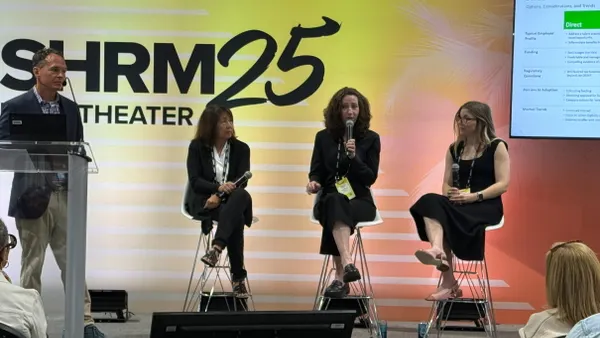Dive Brief:
- Almost 60% of workers have no retirement account assets, according to a report from the National Institute on Retirement Security (NIRS). Individuals who do have money set aside through an employer-sponsored 401(k) or an IRA have more than three times the annual income of individuals who do not have retirement accounts.
- The survey also found that the typical working American has no retirement savings whatsoever. When researchers accounted for all working-age individuals, the median retirement account balance still came to $0. And among workers who have saved for retirement, the average amount leveled off at just $40,000. About 70% of employees age 55 to 64 have a retirement account equal to or smaller than their annual income.
- The report found that more than three-quarters of Americans fail to reach retirement savings targets even after researchers accounted for individuals' estimated net worth.
Dive Insight:
It's not just for the sake of kindness and compassion that employers pay attention to a study like this one. When workers haven't prepared for retirement, empty 401(k)s can mean hard times for businesses, too, Diane Oakley, report author and NIRS executive director, told HR Dive in an interview.
Employees who find themselves without the adequate funds for retired life often decide to keep working. To employers struggling to find and keep talent, this may seem like a potential solution to woes, but that's not always the case, Oakley cautioned. An aging workforce most often correlates with high healthcare costs, she said, since workers need more medical attention as they get older. In addition to losses in productivity, a workforce comprised of many retirement-aged employees keen on staying around will make it difficult for managers to usher in the kind of staff they want, Oakley said.
"The old pension plans helped to manage the workforce because the plan would encourage employees to retire in their 60s, but defined contribution plans don't have that incentive. That's a big difference," Oakley noted. "In the environment we're in, we're not able to manage the workforce as closely as we were before."
To prevent these problems, employers need to encourage employees to start saving for retirement as early as possible. "We need to find ways to get people in those [retirement] plans sooner," Oakley said. "Those early years make such a big difference because you get compound interest."
The most powerful tool Oakley has seen in the workplace to accomplish this is automatic enrollment. "Employers automatically enroll their employees when they become eligible for the plan," she said. Workers are much less likely to learn how to opt out of a program once they've been enrolled, she noted, and when someone enrolls for them, they won't lose valuable time in their procrastination to sign up.











